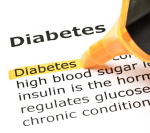
NH Department of Health and Human Services Releases Prediabetes Prevalence Report
 Concord, NH – The New Hampshire Department of Health and Human Services (DHHS) has released a data report on the prevalence of prediabetes among New Hampshire adults. DHHS analyzed results from an annual telephone survey (the New Hampshire Behavioral Risk Factor Surveillance System) and found that nearly 60,000 adults (6% of New Hampshire adults) had been told that they had prediabetes.
Concord, NH – The New Hampshire Department of Health and Human Services (DHHS) has released a data report on the prevalence of prediabetes among New Hampshire adults. DHHS analyzed results from an annual telephone survey (the New Hampshire Behavioral Risk Factor Surveillance System) and found that nearly 60,000 adults (6% of New Hampshire adults) had been told that they had prediabetes.
Prediabetes is defined as having a blood glucose (sugar) level that is higher than normal but not high enough to be diagnosed as diabetes. Having prediabetes is a risk factor for developing type 2 diabetes. Other risk factors for diabetes include being overweight, having a family member with diabetes, being African American, American Indian, Asian American, Pacific Islander, or Hispanic American/Latino heritage, being physically inactive, and having high blood pressure or high cholesterol. Diabetes can lead to serious health problems such as heart disease and stroke.
“Many people with prediabetes are not aware they have it,” said Marcella Bobinsky, Acting Director of Public Health at DHHS, “and in the United States, more than 1 in 3 adults do. There is a great deal that people can do to lower their risk of developing diabetes. Learn the steps to protect your health.”
According to the survey results, prediabetes was twice as common in overweight adults and more common among older adults in the New Hampshire. Prevalence of prediabetes was 50% higher in non-whites than in whites, higher among persons with the lowest household incomes, and higher among adults who reported more days of poor mental health each month.
DHHS encourages New Hampshire residents to talk with their healthcare providers about their risk for diabetes. Research shows two things can help prevent or delay type 2 diabetes: losing 5% to 7% of your body weight, and getting at least 150 minutes each week of physical activity.
DHHS supports a national effort to prevent or delay type 2 diabetes by working with organizations and communities to deliver the National Diabetes Prevention Program, a Centers for Disease Control and Prevention (CDC)-recognized lifestyle change program proven to prevent or delay type 2 diabetes. DHHS will host Lifestyle Coach training in September for individuals or organizations interested in offering the National Diabetes Prevention Program in New Hampshire. Priority will be given to those agencies that serve low-income individuals and people with mental illnesses (such as community mental health centers, peer support agencies, federally qualified health centers, and community health workers) and will provide the National Diabetes Prevention Program to populations with the highest prevalence of prediabetes.
DHHS is also working with healthcare purchasers, payers, and providers to:
- Promote screening for abnormal blood glucose so that New Hampshire adults know if they have prediabetes or diabetes;
- Promote access to the National Diabetes Prevention Program through encouraging reimbursement, expanding the provider network, and including the National Diabetes Prevention Program in the Medicaid Transformation Waiver focused on integrated primary and behavioral health care; and,
- Promote referral to the National Diabetes Prevention Programs in New Hampshire for adults at risk for type 2 diabetes.
Report Conclusion
An estimated 60,000 adults in New Hampshire have been told that they have prediabetes, a risk factor for diabetes. Because prediabetes requires a laboratory test, more New Hampshire adults might have prediabetes than know it. For example, based on laboratory testing, the National Health and Nutrition Examination Survey estimated that 36% of Americans 18 years or older had prediabetes.
Similar to patterns nationwide, prediabetes among New Hampshire adults was associated with increasing age, non-white or Hispanic racial or ethnic groups, higher BMI, and lower physical activity levels. Prediabetes was also associated with various comorbidities. However, this analysis did not control for access to health care among those with comorbidities, and persons with access to health care might be more likely to be both tested for prediabetes and diagnosed with a comorbidity.
To read the DHHS prediabetes data report, please visit http://www.dhhs.nh.gov/data/documents/prediabetes-databrief-2011-13.pdf. For more information on prediabetes, to locate a National Diabetes Prevention Program in New Hampshire, or to see if you have prediabetes, please visit http://www.preventdiabetesnh.org or http://www.cdc.gov/diabetes/basics/prediabetes.html.


